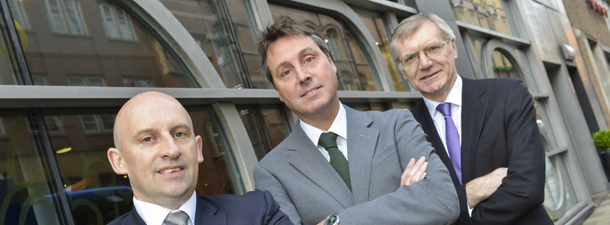Birmingham’s Enterprise Zone and key regeneration projects are the best opportunity to ensure that the city has sufficient high quality stock to meet demand, believes the Birmingham Office Market Forum (BOMF).
The announcement was made at the organisation’s annual networking breakfast at Opus Restaurant – which brings together some of the key business and property players from across Birmingham – during a presentation by key speakers Gary Taylor and Glenn Howells, who are working together on the redevelopment of Paradise Circus.
An unexpected number of high-quality deals took place in Birmingham city centre across 2011, totalling some 670,000 sq ft of stock. This is in stark contrast to the slow start that the city has experienced since the beginning of the year, with only 54,000 sq ft of deals completed.
Jan Thompson, head of Jones Lang LaSalle’s Birmingham office and BOMF chairman, said: “Take-up in central Birmingham in 2011 exceeded expectations and while we have seen a relatively slow start to the year during this first quarter, there is still sufficient stock in the pipeline to meet demand for the next 18 months or so.
“Our main concern is that this stock may not be replenished quickly enough to meet demand from inward investment or attract large corporates. We are therefore looking at what opportunities are available to us as a city and firmly believe that the Enterprise Zone will be a key driver in ensuring that suitable stock is available.”
Defined last year by the Greater Birmingham and Solihull Local Enterprise Partnership (LEP), Birmingham’s Enterprise Zone encompasses 26 sites across the city centre, grouped into seven clusters, including those identified in Birmingham’s Big City Plan.
These include Westside, Snow Hill District, Eastside, the Southern Gateway, Digbeth Creative Cluster, Birmingham Science Park Aston and the Jewellery Quarter.
Gary Taylor, founding member of Altitude Real Estate, said: “The question that we really need to be asking now is how and when Birmingham will come up with the next generation of buildings to allow existing occupiers to grow and provide opportunities for new occupiers to relocate.
“The Enterprise Zone will play a vital role in ‘funding the unfundable’, the essential infrastructure costs that can prevent schemes from being viable.”
During the presentation, Glenn Howells outlined his views on how new challenges for occupiers would shape future workspaces. He said: “The office of the future will have to accommodate an increasingly mobile business environment that requires a more flexible, low-carbon office space. More progressive occupiers are challenging current industry standards and are looking for something different.”
The networking breakfast also saw the launch of the fifth annual Birmingham office market map, which provides an essential update on office market activity that has taken place throughout the previous year, as well as giving an overview of the range and quality of Birmingham’s office stock.
Formed in 2007, the Birmingham Office Marketing Forum works in conjunction with the CoStar Group, who sponsored the networking event, the leading provider of information services to commercial real estate professionals, provides a platform for members to share insights and provide an agreed analysis of statistics relating to the city centre office market.



















